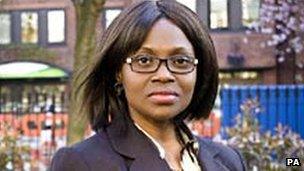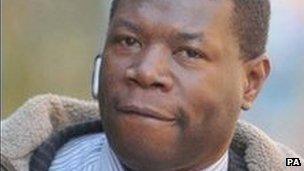Christian discrimination claims heard by Europe court
- Published
The European Court of Human Rights (ECHR) has ruled in the cases of four UK Christians who claimed to have suffered workplace discrimination because of their faith.
Their stories are all different, but the landmark case centred on whether religious principles had a place in the modern British workplace.
It culminated in a ruling in favour of British Airways worker Nadia Eweida, but dismissal of the legal actions in the other three cases.
Nadia Eweida
Ms Eweida - a Pentecostal Christian of Egyptian descent - went home from a job as a check-in worker for British Airways (BA) at Heathrow Airport after she refused to conceal her silver cross necklace.

Nadia Eweida was told her silver cross necklace breached uniform policy
The 59-year-old from Twickenham, south-west London, left work in October 2006 after she was told her necklace breached BA's uniform code.
At the time, the airline had banned the wearing of any visible item of adornment around the neck, but this was changed in 2007 to allow staff to display a faith or charity symbol with the uniform.
Ms Eweida did not return to work until February 2007, after the policy was changed, and was not paid for the time she was absent from work.
She decided to sue BA on the grounds of religious discrimination, but lost her case at an employment tribunal in January 2008.
After the tribunal she expressed her disappointment, saying: "I'm speechless really because I went to the tribunal to seek justice."
She appealed against the decision, but lost the case at the Employment Appeal Tribunal in January 2008.
The judge ruled the wearing of the cross was not discriminatory, because Christians "generally" do not consider it to be a requirement of the religion.
Ms Eweida then took her case to the Court of Appeal, but was again unsuccessful at overturning the ruling in February 2010.
In January 2013, European Court of Human Rights judges found in her favour.
Lillian Ladele
Marriage registrar Lillian Ladele worked for Islington Borough Council in London. When civil partnerships were legalised in 2004, Miss Ladele refused to conduct them, saying it was against her religious beliefs.

Miss Ladele claimed Islington Council had discriminated against her
In December 2007, the local authority changed the rules governing their registrar's working conditions.
Miss Ladele went from effectively working on a freelance basis, which allowed her to swap civil partnership ceremonies with colleagues, to a system which granted her far less flexibility.
Miss Ladele argued she was being forced by the north London council to chose between her religious beliefs and her job. She claimed she was shunned and accused of being homophobic for refusing to carry out the ceremonies.
In July 2008, an employment tribunal ruled in Miss Ladele's favour, agreeing that she had been harassed.
At the time, Miss Ladele hailed the decision as a "victory for religious liberty".
But in December that year the Employment Appeal Tribunal reversed the ruling, and it was upheld for a second time by the Court of Appeal in 2009.
The Supreme Court refused to allow Miss Ladele to appeal again, prompting her decision to consider taking her case to the European Court of Human Rights.
But the European judges rejected her action in January 2013.
Shirley Chaplin
In a similar case to Ms Eweida, former nurse Mrs Chaplin was also asked not to display her cross necklace by her then employers, the Royal Devon and Exeter Foundation NHS Trust.
They also claimed during the case, in 2009, that the 56-year-old's necklace breached health and safety guidelines, because it could be grabbed by a patient and potentially hurt Mrs Chaplin.

Mrs Chaplin had worn the cross necklace on the wards for 30 years
She had worn the cross on the wards for 30 years without incident, and offered to have a quick-release magnetic clasp fitted, which the hospital refused.
Hospital officials said they discussed several ways the ward sister could wear the cross, including concealing it under her clothes, but when the nurse refused she was asked to work behind a desk instead of with patients.
Her discrimination case was heard by an Employment Appeal Tribunal in 2010, but they failed to uphold her complaint.
When Mrs Chaplin, from Exeter, decided to pursue the case at the ECHR in March 2012, she told the BBC she did not realise the strength of her faith - until it was questioned.
"It was a case of my job or my faith - and I chose my faith," she said.
She took early retirement last year in response to the row.
In their ruling in January 2013, European judges rejected Mrs Chaplin's legal action.
Gary McFarlane
Relationship counsellor Mr McFarlane was sacked by his employer, Relate Avon, after saying he objected to giving sex therapy guidance to same-sex couples.
Employed by the national counselling service in May 2003, the former church elder from Bristol claimed his religious beliefs meant he could not promote gay sex.

Mr McFarlane's Christian principles meant he did not want to give sex counselling to homosexual couples
The 51-year-old was suspended in October 2007 after meeting with his manager to discuss the issue, and was eventually dismissed for gross misconduct in March 2008.
Charity Christian Concern said Mr McFarlane "never refused" to provide sex therapy to a homosexual couple, but had told his managers if such a situation arose he would discuss it with them.
His case was dismissed by both an internal appeal at Relate and an employment tribunal.
In November 2009, the Employment Appeal Tribunal again refused to uphold Mr McFarlane's claims of unfair dismissal.
His application to appeal the tribunal's decision was turned down twice by the Court of Appeal in April 2010.
Speaking after the ruling, Mr McFarlane said: "There should be allowances taken into account whereby individuals like me can actually avoid having to contradict their very strongly-held Christian principles."
ECHR judges agreed with earlier rulings and dismissed the case in January 2013.
- Published15 January 2013
- Published12 July 2011